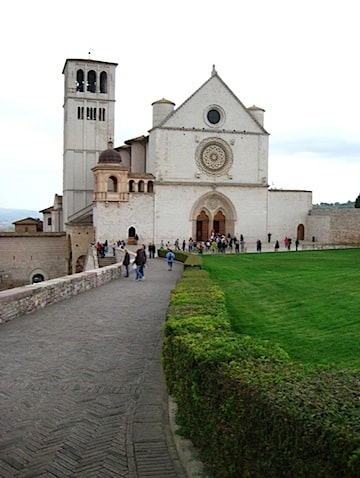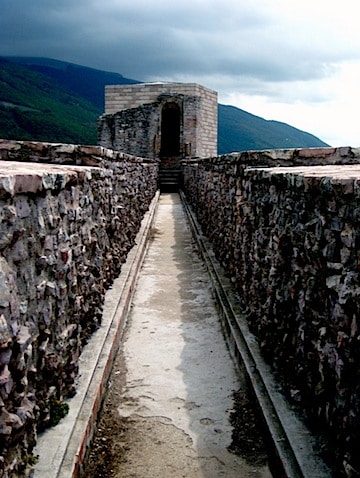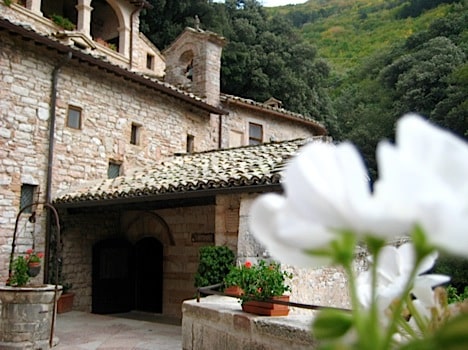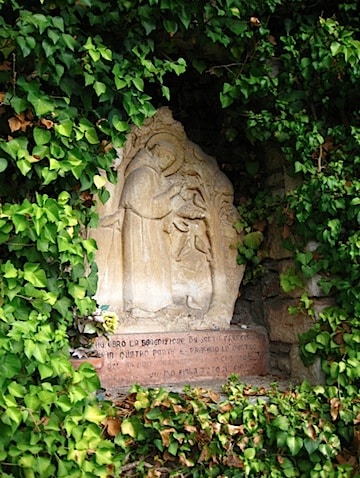I’m not Catholic, but I’m a fan of anybody who gives the critters of the world a second thought. This is most of why I hopped on a train from Florence to Assisi while studying abroad for a semester in northern Italy. The other reason has to do with an old PlayStation game featuring Lara Croft, but we won’t talk about that.

St. Francis of Assisi was born in this quiet little town in 1182. St. Francis, before he was Saint anything, was born Giovanni Francesco di Bernardone and was only nicknamed “Francis” after his father’s love of France. Francis experienced little financial hardship in his youth and, contrary to his later call for peace, took up arms in a fight for Assisi. He had a revelation en route to war in 1204 and began preaching from the streets a much-loved message for poverty when he came home. In 1219, he went to Egypt hoping to become martyred at the hands of Muslims, who instead supposedly befriended him. In 1224, Francis received the stigmata and died two years later.

Agnostic in Assisi
I myself had a revelation—three of them—during my two-night stay in Assisi. Few of them were as pleasant as St. Francis’s, but my trip was not without a lesson learned in humanity.
I broke in my new shoes walking up and down the hills of this town, and I began my journey downhill on the road to the Basilica di San Francesco. I didn’t envy the woman walking in front of me—she was wearing heels—and I thought nothing of it when she ignored the pleas of a pair of women asking passersby for donations. I don’t remember now what the charity was for but I put a few Euros into their hands. They gave me a painted, wooden ornament of St. Francis petting a lamb.
Some time later, within the walls of the basilica on Paradise Hill (formerly Hell Hill, where people had once faced the gallows and St. Francis wished to be buried amongst criminals and outcasts), I saw the woman in heels again. This time, she was on her knees, praying in the lower church to the body of St. Francis in his crypt.
“Huh,” I said to myself.

I left the lower church and climbed up the long stairway back to the upper level. After snapping a few pictures, I turned to my map to study the streets. It didn’t take long for an Italian man to approach me and attempt in his broken English to escort me to a café. I learned over my time in Italy that it isn’t unusual for an Italian man to unabashedly and persistently approach an unaccompanied woman, even if she insists she is married. Assisi was one of my first destinations, so it surprised me to be approached so quickly and relentlessly in front of a cultural legacy such as the Basiclica of St. Francis by a man with a marriage band glinting on his left hand. What surprised me was his openness to do so in front of his entire community; although he admittedly could have been a tourist himself, his attire and briefcase hardly corroborated that theory.

As I moseyed away from the main roads to admire close-knit homes and red flowers hanging out their windows, I soon realized that no one in this town not wearing a nun’s habit was younger than 50. After one day of being repeatedly approached with offers for free coffee, I surmised that, next time around, I would bring a friend to feel less self-conscious.
A Taste of Umbria, Assisi is by no means a shady place. In fact, I look back on it fondly. You’ll find this sort of un-Catholic behavior everywhere around the world. Although being stared down by every other male in the town effectively shattered my image of the place as a cozy Umbrian sanctum, it hit me over the head with the reality that people are people everywhere, flawed by nature but not without virtue and hope. It was, after all, an elderly Italian man who placed his umbrella into my hands when he spotted me shivering under the roof of a bakery, waving his hand dismissively when I said I would pay him for it.
Assisi is a lovely, quiet town conducive to contemplation, lazy afternoons with gelato, and nature walks. Here, you can walk anywhere and everywhere on a small budget. For younger travelers, I would advise going with at least one companion, not only to diffuse the awkward cat calls, but so you’ll have some form of company besides the TV in your hotel room when everything shuts down at 8p.m.

Assisi Essentials:
Get there – From Europe, fly to Milan. Travel by train from there, Florence, Siena, or practically anywhere in Italy.
Stay – Green Hotel Assisi is near the Basilica di San Francesco and even has its own pool for $65 a night.
Eat – Grotto Antica doesn’t have much on the menu, but the numbers next to the Euro signs are great bargains for such fine flavors. If you want to have a glass of wine after a day of walking up and down the hills of Assisi, here’s the place. Find it on Vicolo Buscatti 6 Piazza del Commune.
Snack – Gran Caffè is perfect whether you’re hankering for an afternoon snack or an indulgent morning pastry, this is the place for those of us with a sweet tooth. The gelato is the best in Umbria, I’m convinced, and the cappuccino was nothing short of heavenly. If you’re around town in the warmer months, try the iced tea with peach (tè freddo alla pesca). Find it on Corso Mazzini 16 Piazza del Commune.
See – The Basilica di San Francesco is still undergoing construction from a series of deadly earthquakes in 1997, but it’s still well worth the trip. Go downstairs to see St. Francis’s crypt. See – Rocca Maggiore is the larger of two fortresses in the environs of Assisi. Check it out on Via della Rocca N Piazza del Comune for your dose of medieval life.
Do – Take a nature walk to Eremo delle Carceri, 4 km outside the city where St. Francis retreated to contemplate his message.
This post was written by Maria Rainier a freelance writer and blog junkie. She is currently a resident blogger at First in Education where she writes about education, online degrees, and what it takes to succeed as a student taking a masters degree program remotely from home over the internet. In her spare time, she enjoys square-foot gardening, swimming, and avoiding her laptop.


